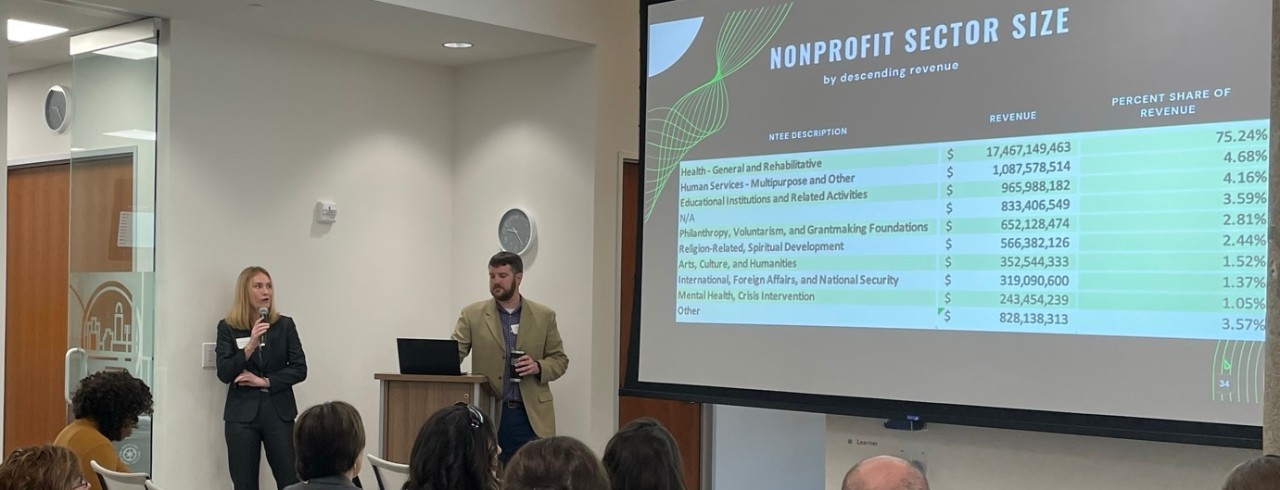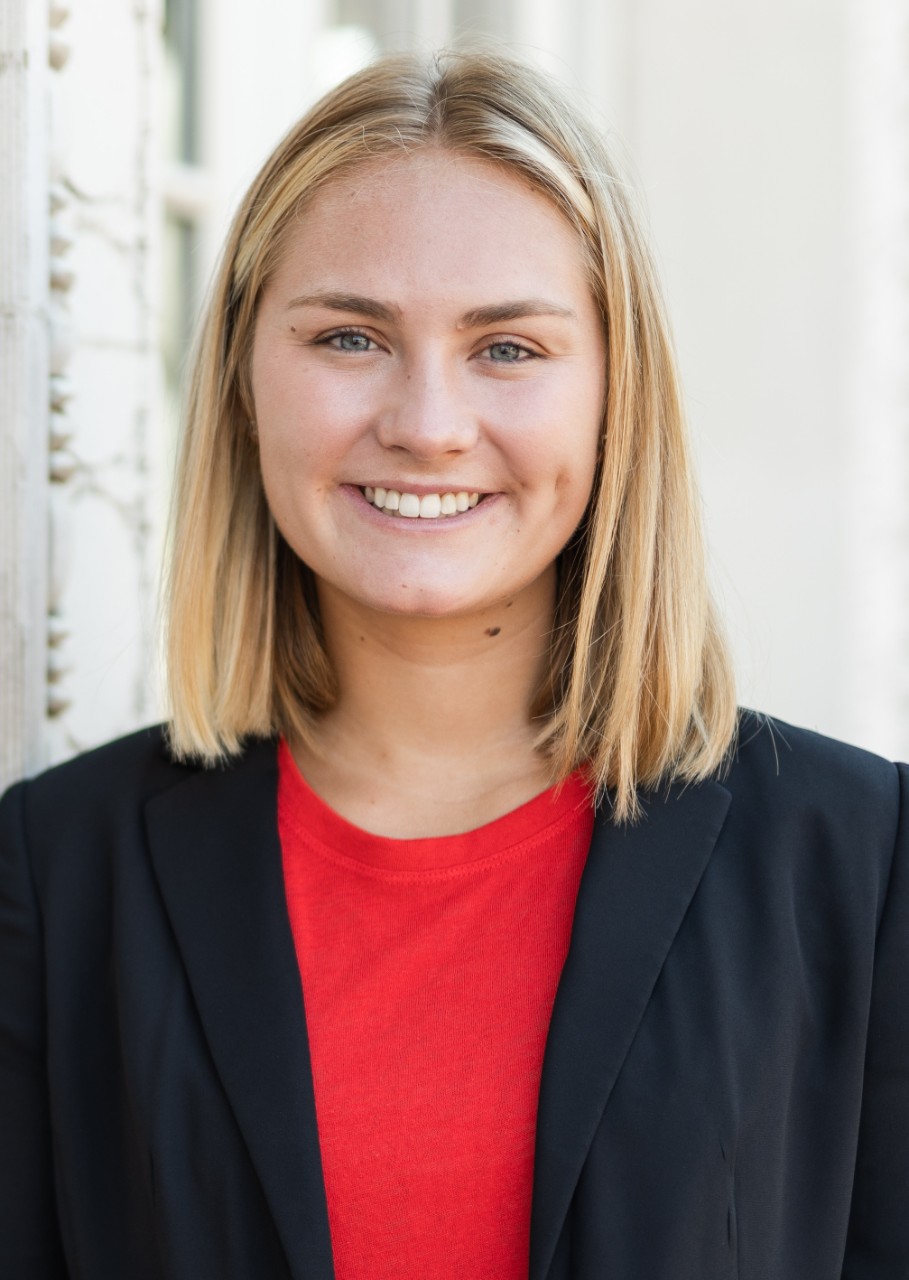
UC student reveals insight into pandemic’s effects on nonprofits
Annie Hugenberg presents findings at inaugural workshop series
Analysis conducted by a University of Cincinnati economics and marketing student has provided a better understanding of the COVID-19 pandemic’s effects on the nonprofit industry.

Annie Hugenberg
Annie Hugenberg, Carl H. Lindner College of Business senior and Kautz-Uible Amanda Wait Research Fellow, spent the past semester conducting an in-depth analysis of the economic landscape of Cincinnati’s nonprofit sector, culminating with her presentation at the first-ever installment of Better Together — a workshop series for the local nonprofit community made possible by OneSource Center for Nonprofit Excellence, the Leadership Council for Nonprofits, the Cincinnati chapter of the Association for Fundraising Professionals, Interact for Health, and Pro Bono Partnership of Ohio.
The nonprofit space is something that is near and dear to Hugenberg’s heart.
“From a young age, I’ve always been drawn to serving others,” she said. “During my time at Lindner, I’ve sought out opportunities to explore this passion by partnering with nonprofits both in and out of the classroom, through my co-ops, academics and student involvements.”
Hugenberg’s first co-op rotation was with a local organization called the Leadership Council for Nonprofits, whose mission is to “maximize the impact of nonprofit organizations, develop their leaders, and strengthen the community.” Working closely with the Leadership Council’s Board Orientation and Leadership Development program, she got an up-close view of the inner workings of nonprofits and how they operate in relation to boards.
On campus, Hugenberg joined Students Consulting for Nonprofit Organizations her first year at UC and eventually became president; in this role, she connected the needs of local nonprofits with UC students’ desire to serve and grow as young professionals.
Under the guidance of the Kautz-Uible Economics Institute’s Academic Director Michael Jones, PhD, Hugenberg has put all that she's learned to practice through an independent study of the pandemic's effect on the nonprofit industry as she examined the economic landscape of local nonprofits pre- and post-COVID-19. With the help of artificial intelligence (AI) chatbot ChatGPT, she wrote code to analyze the economic trends in 2019 and 2021 across different focus areas within the nonprofit space, such as the arts, cultures and humanities, and education.
Nonprofits can have the power and the drive to change the world, but oftentimes, smaller-scale organizations do not have the same resources that for-profit businesses have.
Annie Hugenberg Kautz-Uible Amanda Wait Research Fellow
During the Better Together session, Hugenberg spoke directly to local nonprofits, providing them with an exploration of the economic outlook of the sector — including a national overview, a local breakdown and a summary of economic trends — in an effort to inform their business decisions in the future.
Among these trends was a significant cash increase for local nonprofits during the pandemic due to COVID-19-related stimulations, which allowed organizations to increase cash on hand to around six months compared to four months in 2019.
Hugenberg also found that fundraising expenses decreased by nearly 45%, but fundraising income only decreased by 9%, demonstrating that while nonprofits were spending less on fundraising, they were still able to maintain significant donations.
“Annie demonstrated careful and insightful work on advancing our understanding of the region’s nonprofit sector,” Jones said. “She discovered that nearly 500 501c3s are started every year — illustrating the dynamic nature of this part of the economy — but also suggesting that more collaboration and partnership is needed among various organizations.”
Part of that dynamic nature will undoubtedly be affected by AI technology, an emerging disruptor of the labor market.
Annie's deep dive into the economic outlook of the nonprofit sector and the impact of AI technology was incredibly informative and provides valuable context for future planning.
Christie Brown CEO of OneSource Center for Nonprofit Excellence
In her presentation, Hugenberg explained how AI will inevitably impact employees' responsibilities in the workplace as it replaces some of the tasks they previously completed and encouraged nonprofits to consider how they might adapt to this change.
“Annie's deep dive into the economic outlook of the nonprofit sector and the impact of AI technology was incredibly informative and provides valuable context for future planning,” said Christie Brown, CEO of OneSource Center for Nonprofit Excellence.
Sponsored by Digital Futures, a facility for interdisciplinary research, Hugenberg’s research aligns with its mission of solving problems that matter.
She found that the nonprofit sector is a significant contributor to the economy and plays a crucial role in addressing social and environmental issues — but its organizations often face financial challenges that can hinder their impact.
"The core issues that we've discussed throughout my study of economics include many social inequity issues that nonprofits fight to solve," Hugenberg said. "Nonprofits can have the power and the drive to change the world, but oftentimes, smaller-scale organizations do not have the same resources that for-profit businesses have."
That’s where the need for economic analysis like Hugenberg’s comes in. Through her research, she has equipped local nonprofits with valuable insights that will aid them in maximizing their impact on the community and allow them to spend more time focusing on their respective missions.
Featured image at top: Annie Hugenberg, left, and Kautz-Uible Professor of Economics Michael Jones, PhD, present at the first session of the Better Together workshop series for local nonprofits. Photo/Elizabeth Benson, Leadership Council for Nonprofits
Sarah Asebrook
Become a Bearcat
Whether you’re a first-generation student or from a family of Bearcats, UC is proud to support you at every step along your journey. We want to make sure you succeed — and feel right at home.
Related Stories
Prestigious green and gold accolades highlight UC Earth Day 2021
April 19, 2021
There’s no making light of the ‘Gold’ accolade recently earned by the University of Cincinnati’s Carl H. Lindner College of Business’ new home on campus.
Protect Company Assets by Mitigating Cyber Risks
April 8, 2021
Cyber threats and insurance have become a ubiquitous business issue. Insurance is intended as a vehicle to transfer catastrophic risk to carriers contractually in consideration for premium dollars. There is no coverage area where the risks evolve more rapidly than cyber, and so the insurance must evolve with it.
Tactical Treasury: Fraud prevention is a never-ending task
April 8, 2021
With Nacha rule changes coming in 2021, along with new treasury solutions that are advancing and adapting to a world with more ACH transactions, it’s important to understand how to follow them and mitigate fraud.
Unlocking Your Company’s Value
April 8, 2021
The COVID-19 pandemic has forced businesses to adjust the way they operate. We now meet virtually, find new ways to engage with our employees, and rethink the way we do business. It has been a year of transition as our companies are adapting to a new normal, and it is the perfect time to unlock and discover new value opportunities in your organization.
Protect Yourself With Thoughtful Estate Planning
April 8, 2021
Now is a good time to review personal and family estate planning. Many new opportunities are developing considering the rising optimism with the broader economy, the new administration, and the new Congress. Although the future remains uncertain, there are many things that can be done in the present to protect the interests of your loved ones and yourself.
The making of a successful Faculty & Staff Campaign
May 25, 2021
More than one-third of UC’s nearly 7,000 faculty and staff have already contributed to the 2020-21 Faculty & Staff Campaign, putting the goal of 45% within reach.
UC Foundation Board of Trustees elects six new members
May 11, 2021
The University of Cincinnati Foundation Board of Trustees has elected six new trustees to its 52-member board: Paul D. Green, BBA ’90; Lourdes J. Harshe, BBA ’92; Anndréa M. Moore, BBA’10; Arun C. Murthy, BBA ’95; Kirk L. Perry, BBA ’90, HON ‘15; and Christopher J. Van Pelt, BA ’91, MA ’93.
AACSB renews accreditation for Lindner College of Business
May 13, 2021
The University of Cincinnati Carl H. Lindner College of Business is pleased to announced that the Association to Advance Collegiate Schools of Business International (AACSB) has extended the college’s accreditation.
Three additional days off for UC employees
July 14, 2021
President Neville G. Pinto announced that UC employees will receive three additional days off in 2021 for going 'above and beyond' during the pandemic. The time away will take place during Winter Season Days.
Passing the Baton
August 10, 2021
The past several years have engendered an unprecedented environment for family businesses. When faced with these market pressures, how does a successful family business enterprise respond? What is “success” in a climate like this — and how does succession come into play?